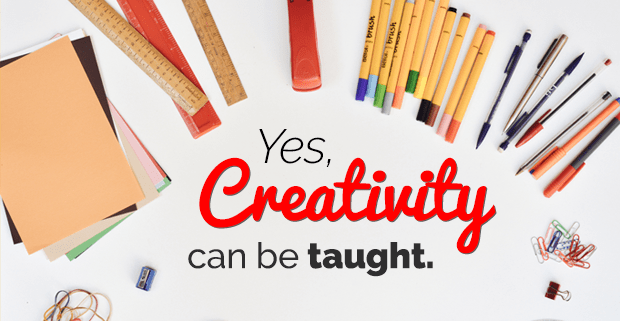
Creativity is a curious thing. It’s a quality that some people just seem to have, while others sigh in discontent and express out loud, “I wish I was more creative.” But those who do appear creative, and who work in creative fields, don’t wish—they do. Every artist, every photographer, every chef, every writer had (and has) to put in thousands of hours of hard work to make a living out of their creative passions. Working in a creative field doesn’t happen out of nowhere—like any other job or hobby, it requires training, education, application, and, of course, deep-rooted interest.
If you’ve ever wished to become more creative, here’s what you need to know: creativity isn’t in a safe that only a select few people know the combination to. Yes, creativity can be taught.
“Creativity isn’t elitist. It’s not just for ‘special people.’ Creativity is a learnable skill, and something that anyone who is willing to invest the time can achieve. You can learn to speak French. You can learn to drive a car,” says David Usher, musician, and author of Let the Elephants Run.
“You can also learn the steps of the creative process and creative thinking. It really is no different. Some will be more naturally talented at specific creative disciplines than others, but determination and grit mean as much, if not more, than natural talent.”
Creativity can be taught, and if you want to learn, you can use the time you have available—even if it’s just 10 minutes a day—to get started.
A lot of the confusion surrounding creativity has to do with myths that people (those who don’t consider themselves to be creative) assume are true. Let’s debunk a few here:
Creative People Only Work When Inspiration Strikes
While creative people do get struck with an idea that can turn into something meaningful, the fact is that if everybody were to wait for a moment of inspiration to strike before working on something, nothing would ever get done. The writer puts pen to paper and jots down 5000 words a day (for example) even if feeling uninspired because that’s what a writer does. It’s work, just like any other job or profession.
The idea that creative people are creative simply because they get these flashes of inspiration—and that separates creative people from everyone else—is simply not true. You don’t have to wait for anything, and if you have a willingness to learn about a particular subject or interest, you can take a class, view online tutorials, and simply teach yourself, and then get in the habit of practice, practice, practice.
“It’s easier to believe in divine anointment than in the endless grind. It’s easier to believe in talent than in work and discipline,” says David.
“Want to be really good at playing the piano? Try practicing every day, for four hours a day, and then do that for four years.“
Creative People Have the Time to Be Creative
Being creative isn’t an exclusive trait. If you’re an accountant and work at a desk all day, it doesn’t mean that you can’t use your evenings and weekends to learn and practice your creative endeavors. Like everybody else, those working in creative fields have their own friends, family, commitments, obligations, client expectations, and more. Creatives experience days full of interruptions and days where nothing seems to be working. In short, creative people don’t have empty schedules and endless amounts of time to simply be creative. Creativity can be taught, and if you want to learn, you can use the time you have available—even if it’s just 10 minutes a day—to get started.
Creative People Work in Isolation
Somewhere along the line, people got the idea that writers live in cabins in the woods, isolated in the middle of nowhere, working away with a bottle of scotch nearby. It sounds idyllic, but the truth is that creative people can’t wait for the perfect settings to appear before getting work done. If you want to paint, you need paint, a paintbrush, and a canvas—everything else is secondary.
If you think you can’t be taught creativity, maybe it’s because you’ve built up an idea of where creativity should take place in your mind—knock that down, the perfect settings for you to learn creative skills are all around you.